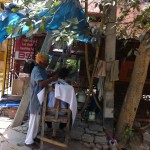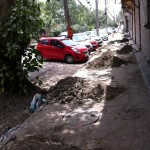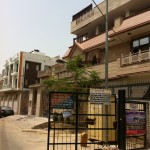A few days ago, I was driving with my cousin and her husband to their house in Gurgaon, when he asked me what I thought was the biggest difference between America and India. After ruminating on the question for several minutes, I realized that despite the overwhelming complexities that have shaped the modern workings and images of both nations, the answer is actually pretty simple.
One is subtle. The other is stark.
To the average person living in Scottsdale, it’s pretty difficult to say that he or she has any first-hand experience with the effects of the recession. If they’re anything like me, they’re aware that unemployment is at an all-time high, foreclosures have been occurring in the truckloads, and that the national debt is so far into the trillions the U.S. government soon might need to make up a new number to describe the amount they owe other people. But they don’t consciously grasp or interact with the repercussions of what any of this means for their daily lives. When the recession hit in 2008, I was in my senior year of high school taking my first economics course, and the relatively small amounts of information I became privy to made me think the whole American experiment was going to explode into a million pieces within my lifetime. Unemployment hadn’t been so high since the Depression? The government had to spend billions to bail out huge corporations as a result of their irresponsible spending? Foreclosures occurred by the thousands all across America? The interest on the national debt could have sent every college-bound kid in the States to the school of their choice FOR FREE? Insane. Completely insane, but also completely factual.
But despite the reality of these facts, there’s no way I would know it by walking out my front door. The same could be said of the many children of my generation I happen to know. Just because America’s fate seemed like the darkest it had ever been (or still is, depending on how you look at it) doesn’t mean this darkness was visible by and large across the country to everyone.
Contrast that with the Indian state of affairs. In the past decade, India has been statistically ranked among the world’s top five largest growing economies, and remains in that bracket with one of the world’s greatest purchasing powers. In the past five years, it has been touted as one of the 21st century’s greatest heralds of economic prosperity.
Today I took a walk for a few blocks around the neighborhood where my grandmother lives in order to get my eyes tested at the local optometrist. My grandmother lives in an area of Delhi called Rajouri Garden, and it only took me 10 minutes of walking to get to the doctor’s office and back. This is what I saw.
If I hadn’t spent every summer in this neighborhood since I was 11, I might have walked back to the doctor for a re-test. Here, within a five-block radius, in this purported place of exponential economic growth, I saw the kind of stark disparity between national image and reality that exists as a direct contrast to the American way of life.





